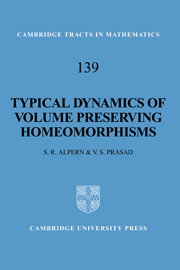Book contents
- Frontmatter
- Contents
- Historical Preface
- General Outline
- Part I Volume Preserving Homeomorphisms of the Cube
- 1 Introduction to Parts I and II (Compact Manifolds)
- 2 Measure Preserving Homeomorphisms
- 3 Discrete Approximations
- 4 Transitive Homeomorphisms of In and Rn
- 5 Fixed Points and Area Preservation
- 6 Measure Preserving Lusin Theorem
- 7 Ergodic Homeomorphisms
- 8 Uniform Approximation in G[In, λ] and Generic Properties in M[In, λ]
- Part II Measure Preserving Homeomorphisms of a Compact Manifold
- Part III Measure Preserving Homeomorphisms of a Noncompact Manifold
- Appendix 1 Multiple Rokhlin Towers and Conjugacy Approximation
- Appendix 2 Homeomorphic Measures
- Bibliography
- Index
3 - Discrete Approximations
Published online by Cambridge University Press: 24 August 2009
- Frontmatter
- Contents
- Historical Preface
- General Outline
- Part I Volume Preserving Homeomorphisms of the Cube
- 1 Introduction to Parts I and II (Compact Manifolds)
- 2 Measure Preserving Homeomorphisms
- 3 Discrete Approximations
- 4 Transitive Homeomorphisms of In and Rn
- 5 Fixed Points and Area Preservation
- 6 Measure Preserving Lusin Theorem
- 7 Ergodic Homeomorphisms
- 8 Uniform Approximation in G[In, λ] and Generic Properties in M[In, λ]
- Part II Measure Preserving Homeomorphisms of a Compact Manifold
- Part III Measure Preserving Homeomorphisms of a Noncompact Manifold
- Appendix 1 Multiple Rokhlin Towers and Conjugacy Approximation
- Appendix 2 Homeomorphic Measures
- Bibliography
- Index
Summary
Introduction
Much of the early work in the 1970s on simplifying and extending the results of Oxtoby and Ulam was based on an observation of Peter Lax [80] that volume preserving homeomorphisms of the cube could be uniformly approximated by dyadic permutations. Lax's approximation technique, based on the combinatorial Marriage Theorem, was able to simply substitute for the original use of the Individual (Birkhoff) Ergodic Theorem by Oxtoby and Ulam. These discrete techniques were later replaced in the theory by more powerful methods (see Chapters 6 and 8). The results in this chapter and those that are based on it (Chapters 4, 5, and 7) will not be used elsewhere. However, the idea of approximating volume preserving homeomorphisms by dyadic permutations is very intuitive and has often led to the first proof of new results later improved on by the other methods.
We motivate the approach of this chapter by considering how volume preserving homeomorphisms may be approximately modeled on a digital computer. Suppose that h is a volume preserving homeomorphism of the space X which is the unit n-cube In or the n-torus Tn obtained from it by identifying opposite sides. We consider schemes by which we may input any point x in X, and obtain the point h(x) as output. Of course we cannot actually input vectors of real numbers into a finite computer, nor can we expect to get them as output. More realistically we would input some number m of binary digits for each coordinate of x, and obtain similar output.
- Type
- Chapter
- Information
- Typical Dynamics of Volume Preserving Homeomorphisms , pp. 13 - 21Publisher: Cambridge University PressPrint publication year: 2001



